

Tao Te Ching
Search Sages
Enter all or part of an sage's name or biography in the fields below, then press tab or enter to filter the list of Authors. Click the headings Name or Biography to sort by that column. Diacritics are ignored when searching.
Click on the author's name to go to their page.
| Author Name | Biography |
|---|---|
| Upagupta | 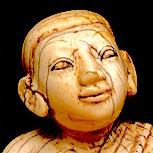 Upagupta Upagupta4th Zen Patriarch, disciple of the Buddha’s close attendant Ananda’s regent, the spiritual teacher of Ashoka who spread Buddhism from a very small community into the greater world; Upagupta is still remembered and venerated in many South East Asian countries, Bangladesh, and with a special, high status in Burma that celebrates a major festival in his honor each year. Immortalized in a poem by Rabindranath Tagore, he refuses the advances of his city’s most famous enchantress when she’s young and beautiful only to nurse and stay with her when she’s suffering from a disfiguring disease. |
| Udhilipa | 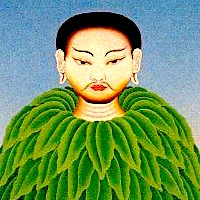 Udhilipa UdhilipaThe Bird-Man On an external level, Udhilipa’s story seems very common: an aristocrat with a great fortune meeting a guru, practicing for many years, and finally achieving realization and psychic powers, in this case an ability to fly. Understanding his story in symbolic terms; however, points toward esoteric inner yoga practices including methods of waking up the 8 body mandala centers that divide into 24 cakras and then into a thousand capillary channels. And as we’ve seen in numerous yogic stories of liberation, flying can mean the freedom from conceptual prisons, body identification, and ego-centric illusions. |
| Tsongkhapa | 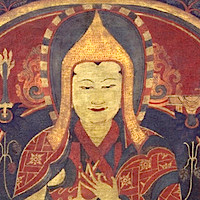 Tsongkhapa TsongkhapaBorn into a nomadic family with a Mongolian father and a Tibetan mother, Tsongkhapa became a famous teacher and founder of the Tibetan Buddhist Gelug school. His study and teachings stretched across many different lineages and he emphasized a blending of teachings, a unifying of different approaches, a balance of intellect and meditation. He used logic to undermine belief and open doors to insight much deeper than the words. His deep understanding of Buddhist teachings led to a fresh, innovative, and contemporary explication that became a dynamic influence on Tibetan Buddhism, culture, monasticism, and politics. |
| Trisong Detsän | 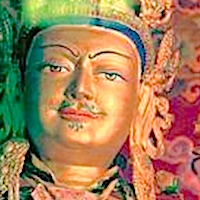 Trisong Detsän Trisong DetsänTrisong Detsun, Ralpacan, Tritsuk Detsen, ཁྲི་གཙུག་ལྡེ་བཙན (806 - 838 CE) One of the famous three “Dharma Kings” who brought Buddhism to Tibet and extended the Tibetan empire to its largest size encompassing parts of modern-day India, Nepal, Khotan, and a large territory in modern China including Sichuan, Xinjiang, and Gansu provinces; Trisong Detsun negotiated a peace treaty with the Uyguhurs in the north and with the Chinese in the east. He brought to Tibet hundreds of scholars, craftspeople, and translators who developed Tibetan literature, a Sanskrit-Tibetan dictionary, and translations of the Tripitaka, Buddhist commentaries, and ancient Tantras. He introduced weight and measurement systems from China, monastic religious organization from India, and set up a system of patronage for priests assigning support from 7 families for each Buddhist monk. |
| Touzi Yiqing | 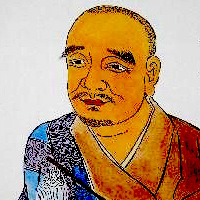 Touzi Yiqing Touzi YiqingSaid to have left his family when only 7 years old to study Buddhism, Touzi came to to the realization that a reliance on words to teach the ultimate truth would always be bound to fail. First leaving one then another tradition, he finally settled into the early Caodong/Soto Zen school and became the dharma heir although he had never met or studied with the previous lineage holder, Dayang Jingxuan. This broke the common practice of direct teacher-to-student transmission and further communicated the depth beneath the words, the heart of understanding under superficial beliefs. |
| Toni Packer |  Toni Packer Toni Packer A Zen teacher minus the 'Zen' and minus the 'teacher.’ Toni Packer (1927 – 2013) |
| Toni Morrison | 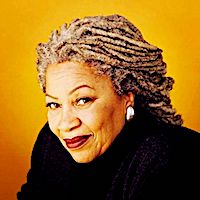 Toni Morrison Toni MorrisonStory-telling voice of American wisdom Novelist, professor, and essayist; Toni Morrison became Random House's first black woman editor. She consistently and insightfully addressed issues like race, feminism, white supremacy, and politics without fixating on extremes and while always keeping on open view. She won the Nobel Prize in Literature, the Pulitzer, the National Book Critics Circle Award, the American Book Award, and she was chosen for the Jefferson Lecture—the U.S. government's highest honor for accomplishment in the humanities. President Barack Obama presented her with the Presidential Medal of Freedom |
| Timothy Leary | 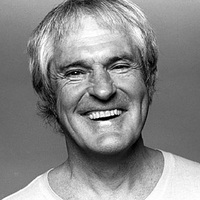 Timothy Leary Timothy LearyPioneering psychonaut, performing philosopher, and counter-cultural hero Harvard professor, "performing philosopher,” counter-culture hero, consciousness explorer, and famous psychonaut; Timothy Leary personified the rebel archetype from an early age. He was court-martialed from West Point for refusing to inform on fellow cadets, expelled from the University of Alabama for spending a night in the female dorm, fired from his professorship at Harvard for allegedly missing classes, and during the 60’s and 70’s was imprisoned in 36 different prisons worldwide. President Richard Nixon described him as "the most dangerous man in America.” In 1960, he teamed up with fellow Harvard professor, Richard Alpert (Ram Dass) to launch the first scientific psilocybin research project; and later, with Allen Ginsberg began a campaign to introduce psychedelics and the discovery of higher levels of consciousness to the broader culture. He pioneered research into the benefits of psychedelics in curing alcoholism, inducing religious experiences, and reforming criminals (dropping recidivism rates rates from 60 to just 20%). He won a supreme court marijuana case and—with the support of John Lennon and Yoko Ono—ran for governor of California (Come Together was a Lennon-written campaign song). An early influence on Game Theory, Transactional Analysis, Aldous Huxley, Robert Anton Wilson, and Huston Smith; Leary became a major influence on modern psychology but also created a back-lash that effectively ended psychedelic research until its revival in modern times. |
| Tim Riley | 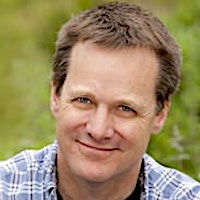 Tim Riley Tim RileyClassical pianist, digital journalist, and music critic; Riley writes for NPR, New York Times, Washington post, and many online news sites. He received a Best Book Review Award and a Best Nonfiction Award for his biography of John Lenno |
| Tilopa | 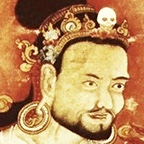 Tilopa TilopaBorn a king, Tilopa - like the Buddha - wasn’t that impressed by fame and fortune and left everything to go on a spiritual search. When he met the teacher Nagarjuna though, he was told to return to his kingdom and kingship. He saved his country during a war with non-violence. He later became a monk and scholar but another teacher, Matongha saw pride remaining from his royal caste and advised him to leave, go into the world, and take a job crushing sesame seeds during the day and procuring for a prostitute at night. This led to him becoming a great Mahasiddha, lineage holder and teacher to Naropa. |
| Thurgood Marshall | 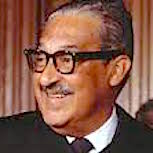 Thurgood Marshall Thurgood MarshallThurgood Marshall (1908 – 1993) Grandson of a slave, refused admission to a law school because he was black, and first African-American Supreme Court Justice; Marshall was instrumental in the Brown v. Board case that desegregated public schools, helped the United Nations draft the constitutions of Ghana and Tanzania, and - before he became Justice - won more Supreme Court cases than anyone in history. He ruled in favor of Roe v. Wade abortion rights, worked to eliminate the death penalty, and probably more than Malcolm X and Martin Luther King made the Civil Rights Movement successful. He remained a tireless and highly effective voice for human rights, individual freedom, the poor, downtrodden and for all people |
| Thucydides | 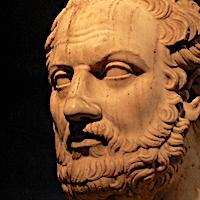 Thucydides Thucydides"Father of realpolitik" General, Athenian historian, and "father of "scientific history;" Thucydides wrote one of the world's most influential books, History of the Peloponnesian War. The United States Founding Fathers—ironically because he hated democracy—used him as a guide for their proposed decision making process. Still studied in military colleges and universities, his theories, analysis of historical events and international relations help explain the cycles of human nature interacting with war, plagues, and other various crises. Along with Hobbes and Machiavelli, a founding fathers of political realism, he focused on understanding the cause and effect of events but also believed that history is too irrational to predict. |
| Thomas Wolfe | 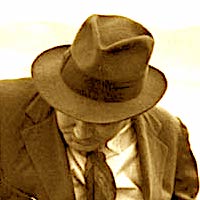 Thomas Wolfe Thomas WolfeFather of autobiographical fiction North Carolina's most famous writer, father of innovative autobiographical fiction, novelist, playwright, and major influence on the Beat Generation writers; Wolfe lived a short but creatively influential life. His famous novel, Look Homeward, Angel included more than 200 thinly disguised references to family and friends in his hometown of Asheville, NC. Their outrage to this book basically exiled him for 8+ years but their equally negative response to his next book was caused by them not being included. William Faulkner called him the greatest talent of their generation, Jack Kerouac idolized him, Ray Bradbury was so impressed he included Wolfe as a character in one of his books, Prince of Tides author Pat Conroy credited him with sparking his writing career, and Hunter S. Thompson thanked him for his famous phrase "Fear and Loathing". |
| Thomas Paine | 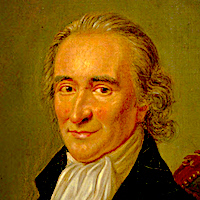 Thomas Paine Thomas PaineFired from his government post in England because of his efforts for the working class and running to escape debtor’s prison, Paine brought a letter of recommendation from Benjamin Franklin to the new world and quickly established himself as a voice for freedom, liberty, women’s rights, prison reform, Newtonian science, and anti-slavery efforts. From a poor family growing up during a time when thousands of small farmers were becoming serf-like factory workers and the gap between super rich and super poor was becoming extreme; he educated himself, became a Founding Father, one of the most essential influences on the Revolutionary War, gave the United States of America it’s name, and wrote the rough draft that Jefferson used to craft the Declaration of Independence. John Adams said that, “Without the pen of Paine, the sword of Washington would have been wielded in vain.” The first to lobby for a Social Security system, his influence extended from American to England, France, South America, and all countries seeking freedom, social justice, and moral equality. |
| Thomas More | 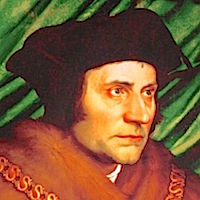 Thomas More Thomas More Thomas Moore (1478 – 1535) Christian humanist, Henry VIII confidant, ascetic, Lord High Chancellor of England, brave psychological explorer; Moore both embraced and went beyond his time and culture. On one hand opposing Martin Luther and the Protestant Reformation, he also protested against Henry VIII’s appropriation of the title, Supreme Head of the Church of England and was beheaded for his efforts. Living at a time of deep cultural transition when idle noblemen raised rents, created land enclosures, caused extreme poverty, starvation, and 72,000 English thieves were hanged; he helped revive a radical interest in Lucretius and Epicureanism. His book Utopia envisioned a society based on the pursuit of collective happiness and included universal health care, public housing, child care centers and a 6-hour work day rather than the prevalent materialism, nepotistic, personal advantage and power. G. K. Chesterton, Jonathan Swift, and many others considered him the greatest Englishman. |
| Thomas Merton | 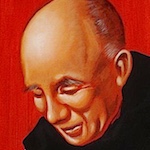 Thomas Merton Thomas MertonMystic, Trappist monk, and friend of Thich Nhat Hanh, Chogyam Trungpa, the Dalai Lama, and D.T. Suzuki; Merton championed social justice issues, the civil rights movement, and ending the nuclear arms race. Writing more than 70 books, he continually studied and practiced not only Christian mysticism but also Buddhism, Taoism, Hinduism, Jainism, Sufism, and Native American spirituality. In 2015 Pope Francis called him, “a thinker who challenged the certitudes of his time and opened new horizons… a man of dialogue, a promoter of peace between peoples and religions.” |
| Thomas Mann | 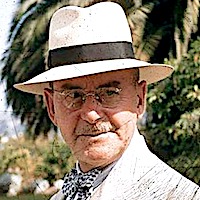 Thomas Mann Thomas MannDeep, psychologically insightful author Novelist, social critic, philanthropist, and 1929 Nobel Prize winner; Thomas Mann became one of the most effective German refugees writing in opposition to Hitler and the Nazi regime in Germany. He became an American citizen and produced many anti-Nazi radio broadcasts in German for the BBC; but, in spite of that, became a target for McCarthyism, had to testify before the House Un-American Activities Committee, and was forced to stop his work for the Library of Congress, and return to Europe. His commentaries on American culture of the time being similar to "how it started in Germany." Mann carried on the philosophical tradition of Goethe, Nietzsche and Schopenhauer; passed it on to writers like Joseph Heller, Yukio Mishima, and Hermann Hesse. |
| Thomas L. Friedman | 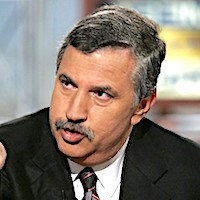 Thomas L. Friedman Thomas L. FriedmanJournalist, author, three-time Pulitzer Prize winner; Thomas L. Friedman became an insightful commentator on the Middle East, global trade, foreign affairs and environmental issues. |
| Thomas Jefferson | 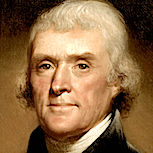 Thomas Jefferson Thomas JeffersonAmerican founding father, main author of the Declaration of Independence, Virginia governor, first Secretary of State, US Vice President and one of America’s greatest presidents; Jefferson negotiated the Louisiana Purchase almost doubling the size of the country and wrote a book considered the most important American one written before 1800. President of the American Philosophical Society, mathematician, architect/designer of the Virginia State Capitol and Monticello, University of Virginia founder, avid horticulturalist and farmer, naturalist deeply interested in birds, inventor of an important new plow design as well as the swivel chair, and speaker of more than 8 languages; he exemplified the ideal of a true Renaissance Man. Although he owned hundreds of slaves, as a young lawyer he defended freedom-seeking slaves, signed an act prohibiting their importation in 1807, and is believed to have secretly “married” and had children with a black woman, Sally Hemings. Always in debt with cash flow problems from continual experiments and pushing on the boundaries of the possible, his creative spirit never died. |
| Thomas Hobbes | 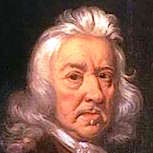 Thomas Hobbes Thomas HobbesSecretary, student, friend to Francis Bacon; Hobbes established the foundation for most modern political philosophy. Formulating social contract theory, he promoted individual rights, natural equality, government based on the will of the people, only representative government as legitimate, and the freedom to do anything that laws don’t forbid. He described human nature as “self-interested cooperation” and introduced mathematical reasoning to the philosophy of science. Though called “the father of totalitarianism” and fixated on peace and order, his radical shift from religion and belief to applying science for understanding human nature helped undermine that same “order” creating more personal, political freedom. |